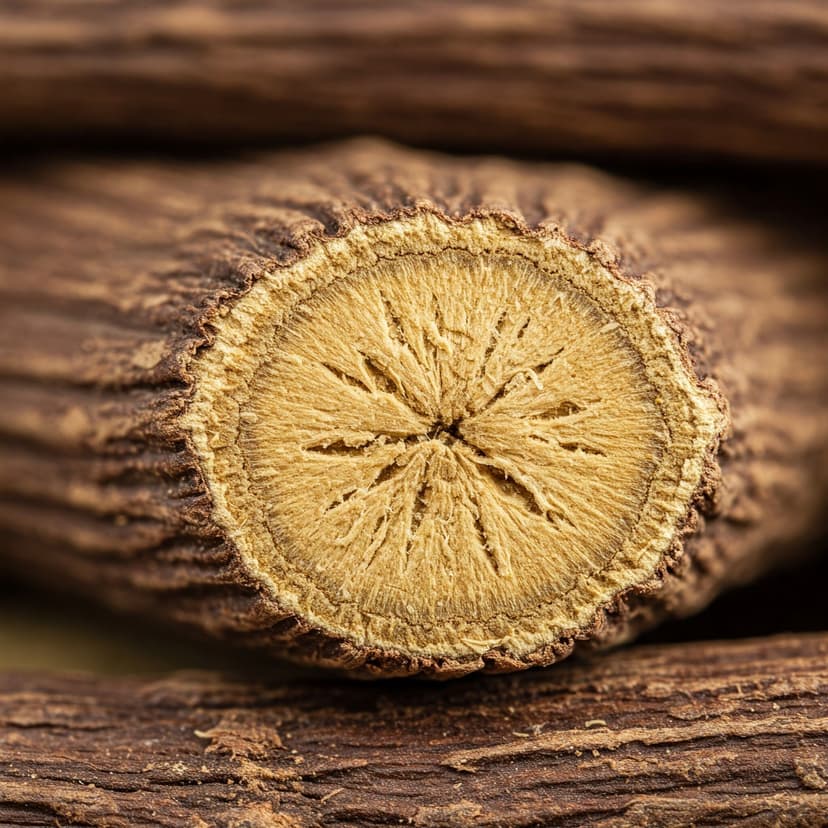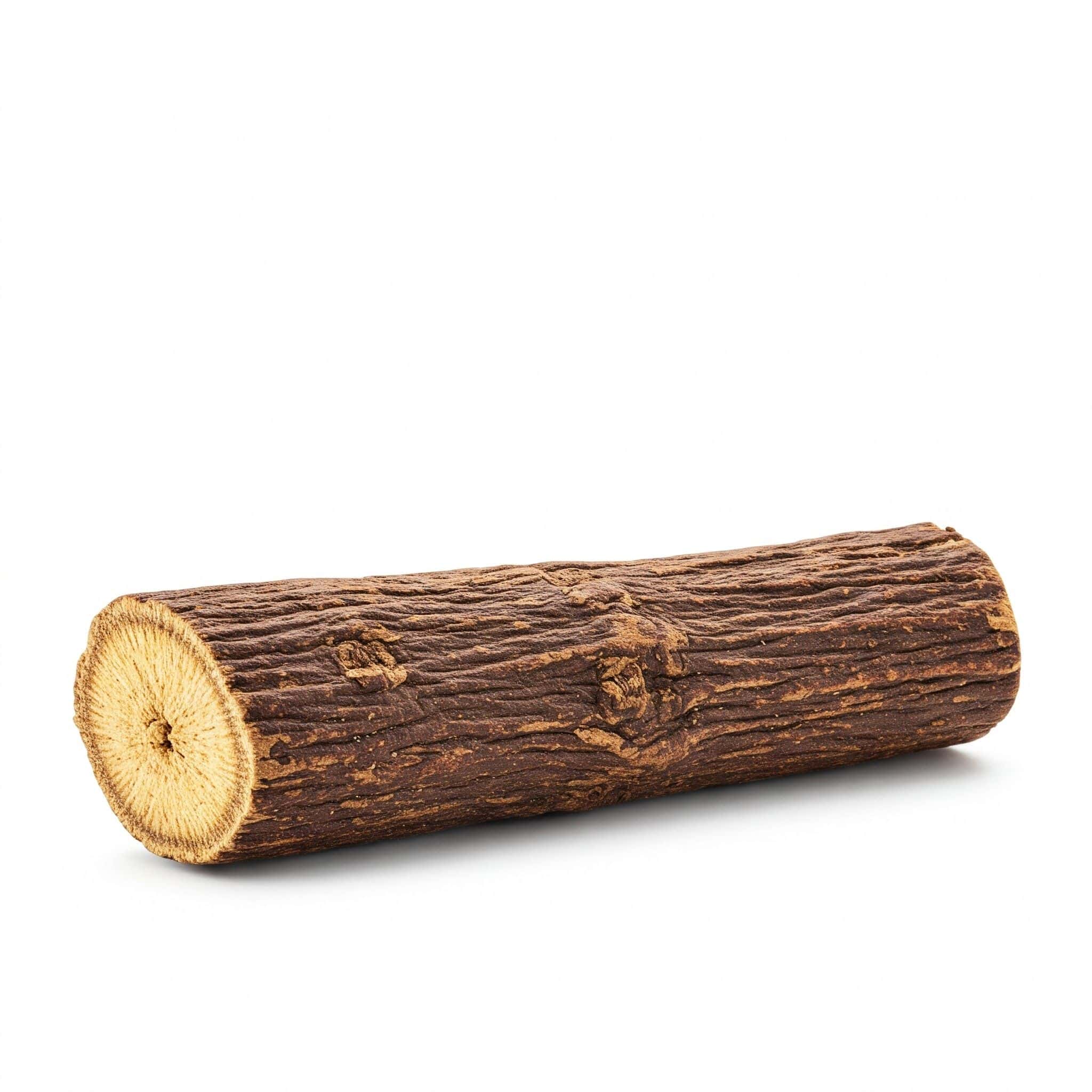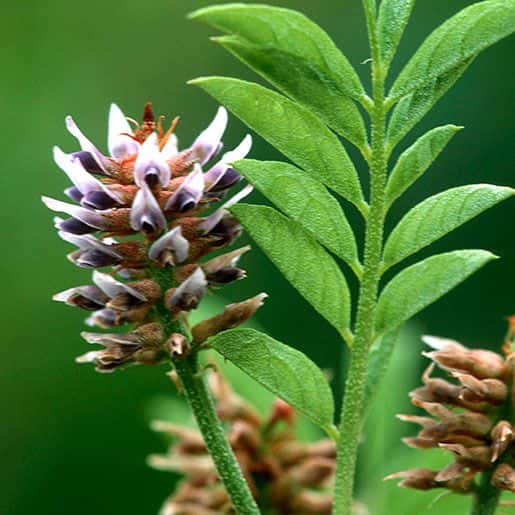


Common Name
Licorice,
Liquorice,
Sweet Root,
Yashtimadhu (Ayurvedic name)
Family
Fabaceae (pea family)
Parts Used
Root and Rhizome
Native To
Native to Southern Europe, Western Asia, and the Middle East. Now cultivated worldwide.
Historical and Traditional Uses:
Traditional Chinese Medicine (TCM) Used as a harmonizer in herbal formulas, soothing coughs, and treating gastrointestinal issues. In Ayurveda it is known as Yashtimadhu, used for its rejuvenating, anti-inflammatory, and expectorant properties. Folk Medicine Commonly utilized for sore throat, ulcers, and as a natural sweetener
Chemical Composition:
- Triterpenoid Saponins: Glycyrrhizin (key bioactive compound)
- Flavonoids: Liquiritin, isoliquiritigenin
- Coumarins: Herniarin, umbelliferone
- Polysaccharides: Arabinogalactans
- Other: Essential oils, tannins, and amino acids
Pharmacological Properties:
- Anti-inflammatory: Reduces inflammation in the respiratory and digestive systems.
- Antiviral: Inhibits viral replication and boosts immunity.
- Expectorant: Clears mucus and soothes respiratory conditions.
- Hepatoprotective: Protects liver cells and supports detoxification.
- Adaptogenic: Reduces stress by regulating cortisol levels.
- Antioxidant: Neutralizes free radicals, preventing oxidative stress.
- Anti-ulcerative: Promotes healing of gastric ulcers and soothes the gut lining.
Evidence-Based Uses and Benefits:
1. Respiratory Health:
- Use: Soothes sore throat, reduces coughing, and clears mucus.
- Study Reference: Wang et al., 2015 demonstrated antiviral activity against respiratory viruses.
2. Digestive Health:
- Effect: Treats gastric ulcers, acid reflux, and indigestion.
- Key Study: Akhondzadeh et al., 2009 confirmed its anti-ulcerative properties in clinical trials.
3. Immune System Support:
- Mechanism: Enhances immune response and inhibits viral replication.
- Research Insight: Studies support its role in managing hepatitis and other viral infections.
4. Stress and Adrenal Support:
- Effect: Modulates cortisol and improves adrenal function during stress.
- Evidence: Proven adaptogenic effects in preclinical and clinical studies.
5. Skin Health:
- Use: May also Treat eczema, psoriasis, and inflammation due to its anti-inflammatory and soothing properties.
- Clinical Insight: Topical formulations have shown significant benefits in reducing redness and irritation.
Counter-Indications:
- High blood pressure (can cause water retention and increase sodium levels).
- Pregnancy (may affect hormonal balance and lead to uterine contractions).
- Kidney or heart conditions (risk of electrolyte imbalance).
Side Effects:
- Potential for elevated blood pressure and water retention with excessive use.
- Hypokalemia (low potassium levels) if taken in high doses for prolonged periods.
- Rare cases of allergic reactions, including skin rash or itching.
Drug Interactions:
- Corticosteroids: May enhance their effects, leading to higher cortisol levels.
- Diuretics: Can increase the risk of hypokalemia.
- Blood Pressure Medications: May counteract the effects of antihypertensive drugs.
- Hormonal Therapies: May influence estrogen and testosterone metabolism.
Research and White Papers with Links:
- Antiviral Activity Licorice respiratory health: (https://pmc.ncbi.nlm.nih.gov/articles/PMC8703329/)
- Digestive Health Effect on gastric ulcers:(https://pmc.ncbi.nlm.nih.gov/articles/PMC3818629/)
- Immune Modulation hepatitis management:(https://pmc.ncbi.nlm.nih.gov/articles/PMC4052927/)
Conclusion:
Licorice root extract (Glycyrrhiza glabra) is a versatile herbal remedy with significant benefits for respiratory health, digestive support, and immune enhancement. Its anti-inflammatory, adaptogenic, and hepatoprotective properties make it a valuable addition to herbal medicine. However, it should be used cautiously in individuals with high blood pressure or kidney conditions.



